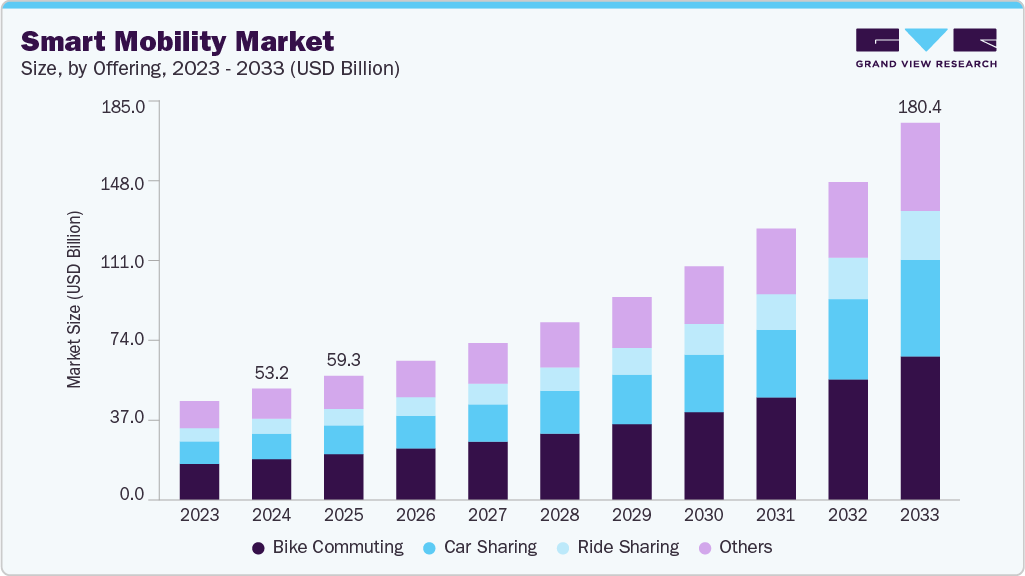Smart Mobility Market 2033: How EVs Are Transforming Urban Landscapes
 Georgie Bill
Georgie BillThe global smart mobility market was valued at USD 53.18 billion in 2024 and is projected to reach USD 180.35 billion by 2033, expanding at a compound annual growth rate (CAGR) of 14.9% from 2025 to 2033. This growth is driven by rising urbanization, which has intensified population density in cities, leading to increased traffic congestion and extended commute durations.

In response, municipal authorities and transportation agencies are seeking solutions to improve mobility efficiency and reduce the economic impact of traffic delays. Technologies such as ridesharing, real-time traffic monitoring, and connected transport systems have become essential tools for addressing these challenges while enhancing user experience. Globally, governments are integrating smart mobility into broader sustainability agendas and urban development strategies. This is supported by policy frameworks, funding initiatives, and smart infrastructure investments aimed at promoting electric vehicles (EVs), autonomous transport, and intelligent public transit systems. In addition, environmental regulations concerning emissions and air quality are encouraging a shift from traditional vehicles to eco-friendly, intelligent mobility alternatives.
Technological advances in artificial intelligence (AI), Internet of Things (IoT), and 5G connectivity are significantly shaping the future of smart mobility. These technologies enable real-time communication between vehicles, infrastructure, and users, supporting predictive maintenance, optimized routing, and integrated multimodal transport. Enhanced with sensors, GPS, and embedded systems, today’s transport networks are more precise, adaptive, and widely adopted across both public and private mobility sectors.
Order a free sample PDF of the Smart Mobility Market Intelligence Study, published by Grand View Research.
Key Market Trends & Insights
North America led the smart mobility market in 2024 with a 38.03% revenue share. This dominance is attributed to the region’s strong technology base, modern transportation infrastructure, and the presence of key solution providers. A growing emphasis on data-driven, sustainable urban transport and increased consumer demand for connected solutions continues to drive market growth in the region.
By offering, the bike commuting segment represented the largest market share at 36.68% in 2024, and it is expected to grow at a CAGR of 15.4% through the forecast period. This trend is fueled by expanding micro-mobility options, environmental awareness, and urban infrastructure that supports biking as a primary commuting method.
Based on solution, the traffic management segment held the highest revenue share of 34.38% in 2024. As cities expand, efficient traffic regulation has become a critical priority. The adoption of AI-based traffic signals, real-time analytics, IoT sensors, and GPS monitoring systems has empowered municipalities to dynamically manage traffic and improve commuter safety.
By technology, radio frequency identification (RFID) accounted for the largest share at 25.41% in 2024. RFID has proven vital for enhancing operational efficiency in applications such as electronic tolling, vehicle tracking, public transport ticketing, and parking access management. Its real-time data capture and automation capabilities make it a core technology in modern transportation networks.
Market Size & Forecast
2024 Market Size: USD 53.18 Billion
2033 Projected Market Size: USD 180.35 Billion
CAGR (2025-2033): 14.9%
North America: Largest regional market in 2024
Asia Pacific: Fastest growing market
Key Companies & Market Share Insights
Major players in the global smart mobility market include Robert Bosch GmbH, Cisco Systems, Inc., Innoviz Technologies Ltd., Ford Motor Company, and Siemens AG, among others. These companies are heavily investing in research and development (R&D) to improve the sustainability, responsiveness, and intelligence of their mobility solutions.
Innovation areas include real-time fleet and traffic management platforms, predictive analytics for route optimization, and automation of mobility services. Additionally, emerging technologies such as cloud-based platforms, AI, IoT, and geospatial intelligence are being leveraged to provide integrated, seamless mobility experiences.
Robert Bosch GmbH, headquartered in Gerlingen, Germany, operates across four core sectors: mobility solutions, industrial technology, consumer goods, and energy & building technology. Its smart mobility offerings include connected vehicle systems, autonomous driving features, EV powertrains, and digital mobility services.
Cisco Systems, Inc., based in San Jose, California, delivers secure vehicle-to-everything (V2X) communication infrastructure, supporting connected and automated transportation. Its systems enable real-time data exchange, secure public transit modernization, and collaborations with automakers to improve in-vehicle connectivity and cybersecurity within mobility ecosystems.
Key Players
Robert Bosch GmbH
Cisco Systems, Inc.
Innoviz Technologies Ltd.
Ford Motor Company
Siemens AG
Toyota Motor Corporation
Excelfore Corporation
TomTom International BV
Daimler AG
Tesla
Explore Horizon Databook – The world's most expansive market intelligence platform developed by Grand View Research.
Conclusion
The global smart mobility market is undergoing a significant transformation, driven by urbanization, sustainability goals, and rapid technological advancement. With a projected CAGR of 14.9% from 2025 to 2033, the market is expected to nearly triple in size. Innovations in AI, IoT, and connectivity are enhancing how cities manage traffic, how people commute, and how mobility services are delivered. Supportive government policies, rising consumer expectations for efficiency, and the urgency to address environmental concerns are all pushing the industry toward intelligent, integrated, and eco-conscious transportation systems. As public and private stakeholders continue to invest in smart infrastructure and digital platforms, smart mobility is poised to become a defining feature of future urban life.
Subscribe to my newsletter
Read articles from Georgie Bill directly inside your inbox. Subscribe to the newsletter, and don't miss out.
Written by
